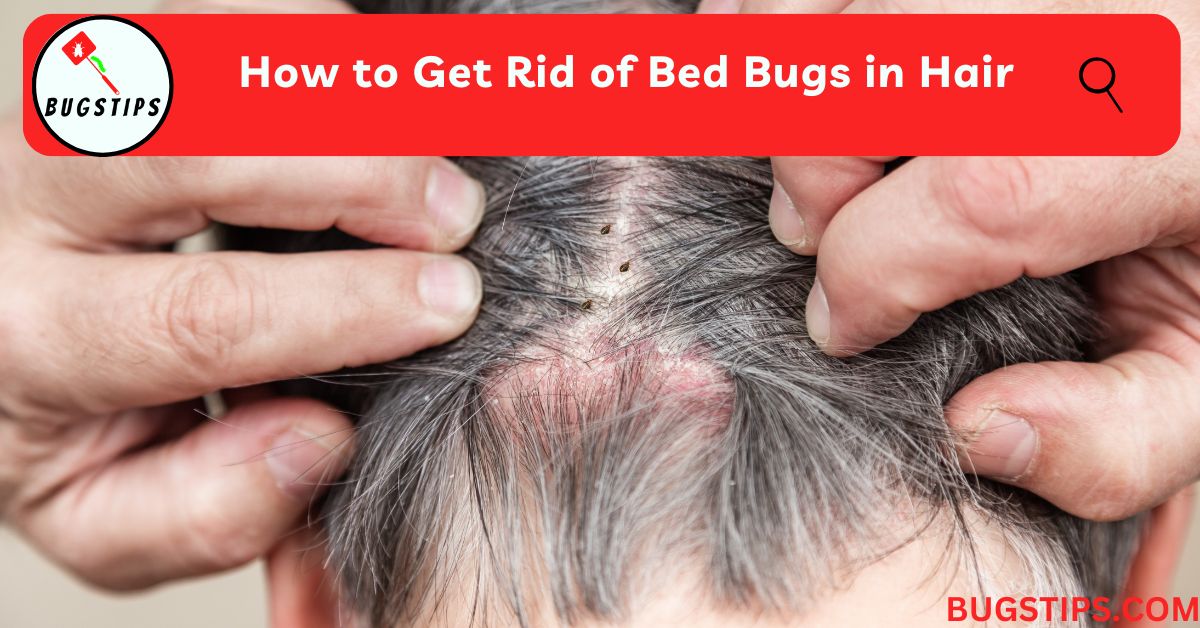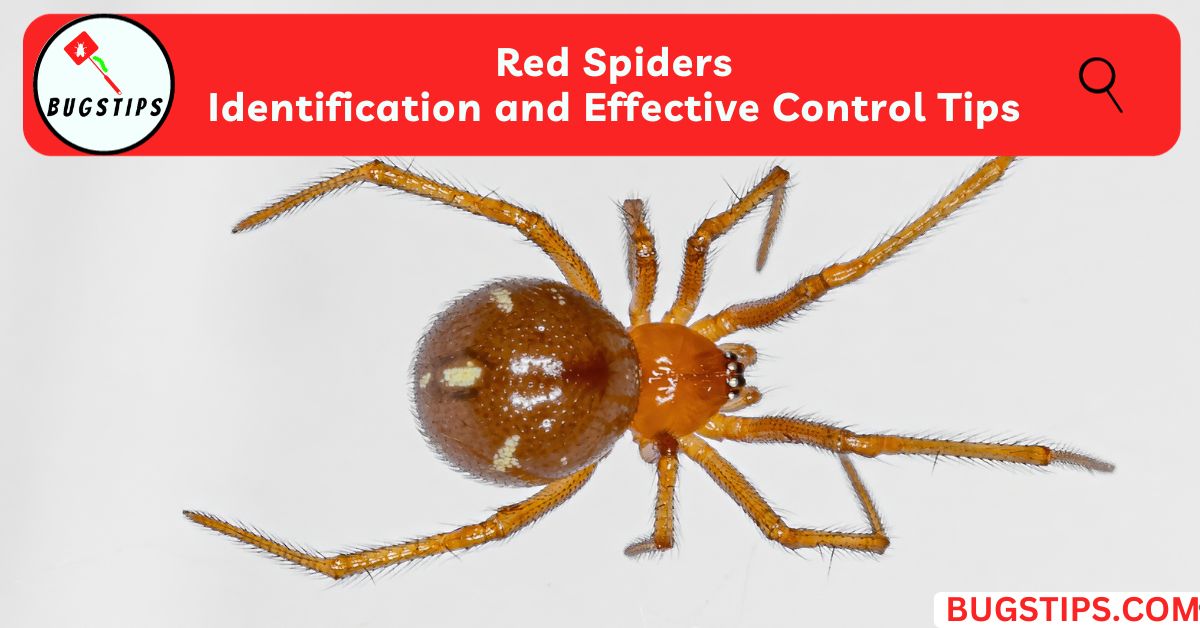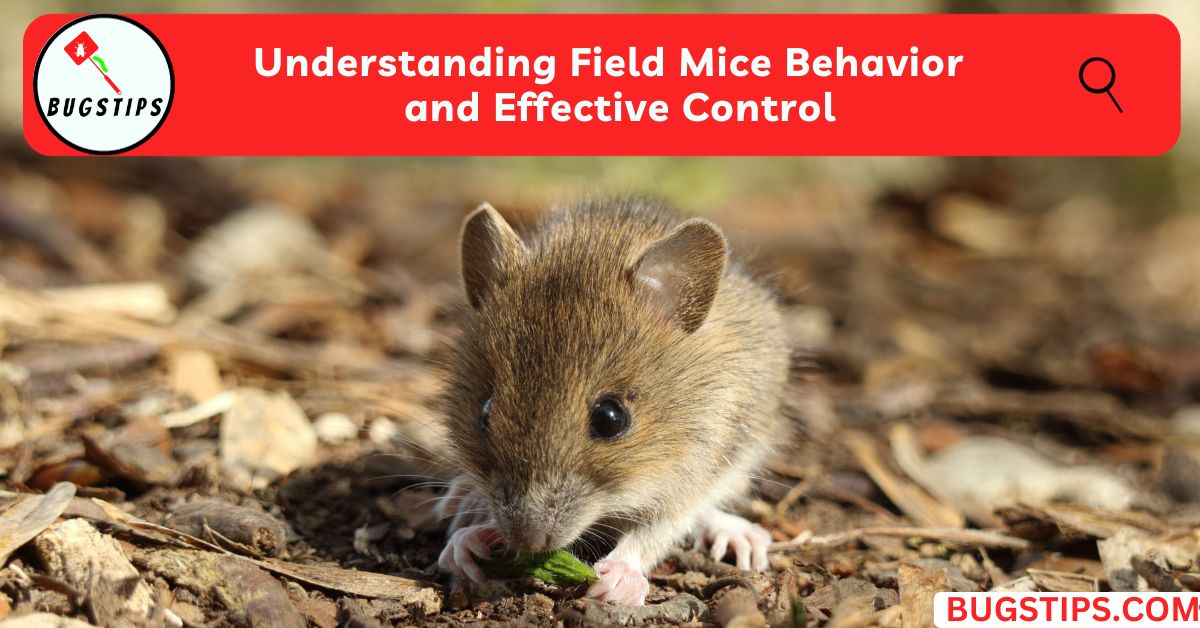This post may contain affiliate links which means as an Amazon Associate, this site may earn a small commission on qualified purchases made through links at no extra cost to you. Learn more on Affiliate Disclosure
If you’re here, chances are you’re wondering: what do silverfish eat? These small, wingless insects may not look like much, but they can cause significant damage in homes and businesses.
In this article, we’ll cover everything you need to know about what silverfish eat, from their general diet to the specific items they consume in homes.
So, if you want to learn what silverfish eat and how to keep these pests at bay, keep reading!
What Do Silverfish Eat? Complete List
Silverfish are known for their unique dietary preferences, which include a wide range of foods. If you’re dealing with a silverfish infestation, it’s important to understand what types of foods they’re attracted to.
Here’s a comprehensive list of the different foods that silverfish eat:
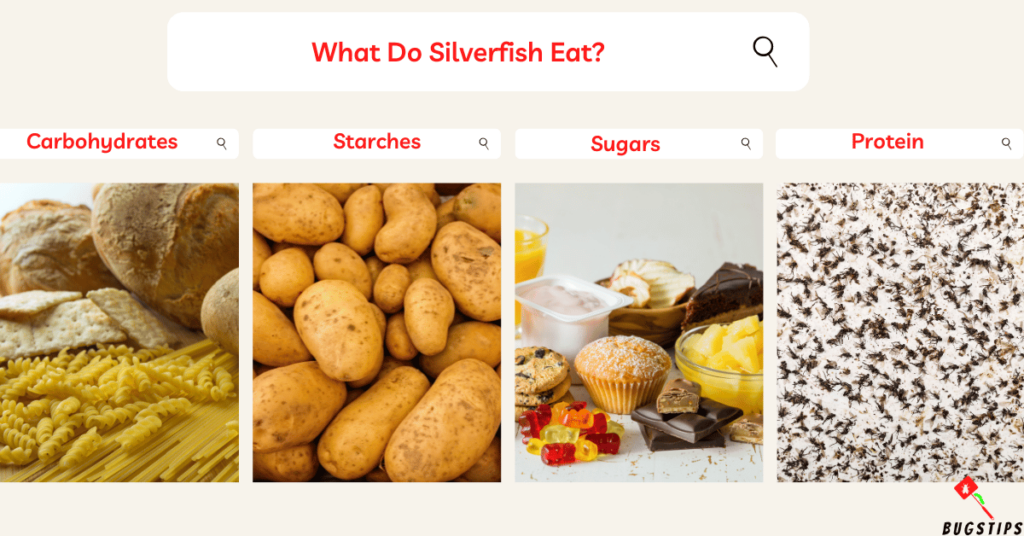
Carbohydrates
Silverfish are fond of carbohydrates, which can be found in a variety of foods. Some of their favorite carbohydrate-rich foods include cereal, pasta, and bread.
Starches
Silverfish are also drawn to starchy foods, such as potatoes and rice. They may even feed on the glue that’s used to bind paper together, which contains starch.
Sugars
Like many other pests, silverfish are attracted to sweet foods. They may feed on sugary items such as chocolate, candy, and even dried fruits.
Protein
In addition to carbohydrates and sugars, silverfish require protein in their diet. They may consume dead insects, pet food, and even human hair in order to obtain the protein they need.
Related Article – Where Do Silverfish Come From?
As we delve deeper into the dietary habits of silverfish, it’s worth exploring specific examples of what they eat.
Here is a more extensive list of the things that silverfish are known to consume:
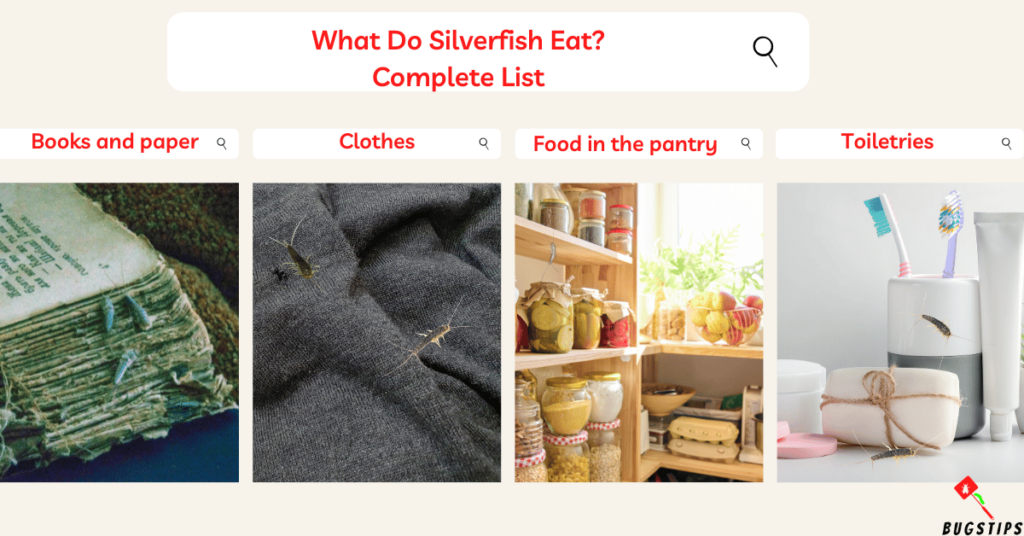
- Books and paper: Silverfish are notorious for feeding on paper products, including books, magazines, and newspapers. They may also target important documents, such as birth certificates and passports.
- Clothes: Silverfish may feed on clothing made from natural fibers like cotton and silk. They’re particularly drawn to fabrics that contain starch or sugar, such as those that have been stained with food or sweat.
- Food in the pantry: Silverfish can infest pantry items such as grains, vegetables, sugar, flour, and even pet food. They’re also known to target coffee and other pantry staples.
- Toiletries: Silverfish may feed on toiletries such as shampoo, toothpaste, and soap. They’re drawn to these items because they often contain sugar or other carbohydrates.
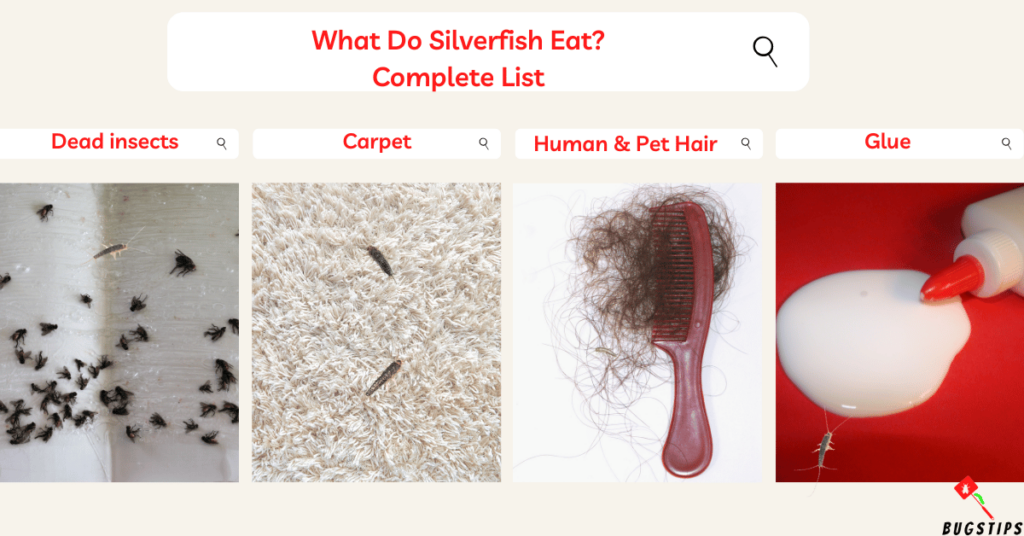
- Dead insects: Silverfish are known to consume dead insects, including their own species. This can lead to cannibalistic behavior in large infestations.
- Carpet: Silverfish may feed on the fibers in carpets, particularly if they contain natural fibers like wool. They may also consume carpet glue and padding.
- Human & Pet Hair: Silverfish have been known to feed on human and pet hair as well. While it may seem odd, the proteins found in hair are attractive to silverfish and provide them with a source of nutrition. This is why it is not uncommon to find silverfish in bathrooms and other areas where hair tends to accumulate.
It’s important to note that silverfish are omnivores and will eat just about anything if they’re hungry enough.
Related Article – Do Silverfish Bite?
What Do Antarctic Silverfish Eat?
While the name may suggest otherwise, Antarctic silverfish and home silverfish are two very different creatures. Antarctic silverfish (Pleuragramma antarctica) are pelagic fish that inhabit the freezing waters surrounding the Antarctic Peninsula.
Their diet consists of a variety of small invertebrates, including copepods, krill, amphipods, mysids, pelagic polychaetes, pteropods, ostracods, and other benthic invertebrates as well as fish.
It’s important to note that unlike home silverfish, Antarctic silverfish do not feed on household items. They are not pests and live exclusively in water. When they are small, they feed on tiny organisms such as copepods, but as they grow larger, they may consume larger prey.
So, while both types of silverfish may share a name, their diets and habitats are vastly different.
How Do Silverfish Find Food?
Silverfish have a remarkable ability to locate sources of food within homes. They rely heavily on their sense of smell, which allows them to pick up on even the faintest traces of food.
Silverfish are attracted to dark, damp places with high humidity levels. This is why they are commonly found in bathrooms, kitchens, and basements.
Once they have found a food source, silverfish will often leave behind pheromones to mark the location. This helps them remember where they have found food in the past and makes it easier for them to locate it again in the future.
It’s important to note that silverfish can survive for long periods of time without food, but they will still actively seek out new sources to ensure their survival.
Do Silverfish Bite People?
There’s a common misconception that silverfish are dangerous to humans because they might bite. But the truth is, silverfish do not bite people.
Read Our Full Article About – Do Silverfish Bite?
They may look a little creepy and crawly, but they are not harmful to humans. In fact, they’re actually quite shy and prefer to avoid people altogether.
So, if you see a silverfish scurrying across your floor, there’s no need to worry about being bitten or harmed in any way.
What Animals Eat Silverfish?
Silverfish have a number of natural predators that can help keep their population under control.
Here are some of the predators that feed on silverfish.
- Spiders: Many spider species feed on silverfish, including cellar spiders, cobweb spiders, and jumping spiders. These spiders are often found in homes and can help keep silverfish numbers down.
Related Article – How to Get Rid of Spiders Under Eaves
- Centipedes: Centipedes are known for their many legs and are efficient predators. They feed on a variety of small insects, including silverfish.
- Certain types of birds: Birds like swallows, chickadees, and wrens are known to feed on silverfish. These birds can be attracted to homes with large silverfish populations.
Related Article – Do Birds Eat Spiders? Discover 23 Surprising Spider-Eating Birds!
- Earwigs: Earwigs are insects with pincers at the end of their abdomen. They are known to feed on silverfish, among other insects.
Related Article – What Do Earwigs Eat? A Comprehensive Guide
If you have a silverfish infestation, allowing the predators to remain in your home can help keep silverfish numbers down.
However, it's important to keep in mind that some of these predators, such as certain spiders, may also be considered pests. It's always a good idea to consult with a pest control professional to determine the best course of action for your specific situation.
Can Cats and Dogs Eat Silverfish?
Silverfish are not toxic or poisonous to cats and dogs, so they can eat them without any harm. However, it’s not ideal for them to do so. While there are no known health hazards associated with cats or dogs eating silverfish, it’s better to avoid it altogether.
As explained above silverfish do not pose any threats to pets or other animals. They won’t bite, sting, or particularly bother your pet, and are not likely to pose any sort of threat to them. However, if your pet eats too many silverfish, it could potentially upset their stomach or cause other digestive issues.
Related Article – Do Silverfish Bite?
If you want to keep your dog or cat from trying to eat a silverfish, it’s better to be safe and keep them away from areas where silverfish are known to inhabit.
How to Prevent Silverfish from Eating Your Household Items?
Protecting your household items from silverfish is essential to safeguard important documents like birth certificates, identification cards, bank books, and even your passport.
Silverfish have a voracious appetite for various items, including books, papers, clothes, grains, vegetables, sugar, flour, pet food, coffee, shampoo, toothpaste, soap, carpet (wool), and even human hair.
To prevent them from causing damage, you need to take proactive steps to control silverfish infestations and protect your belongings.
Here are some tips to help you keep silverfish at bay and safeguard your household items
- Books and paper: Silverfish are known to consume the glue and sizing used in bookbinding, as well as the starch in paper products.
- To prevent damage to books and paper items, store them in a dry location away from areas that silverfish may inhabit.
- Clothes: Silverfish are attracted to natural fibers like cotton and silk, and can cause damage to clothing items like shirts, pants, and even linens.
- Keep your clothing in sealed plastic bags or containers, or store them in a dry, cool location.
- Grains and vegetables: Silverfish are known to eat grains like oats and rice, as well as fresh produce like potatoes and carrots.
- To prevent silverfish from consuming your food, store these items in sealed containers or in the refrigerator.
- Sugar and flour: Silverfish are attracted to the carbohydrates found in sugar and flour, and can cause damage to pantry items like baking ingredients.
- Keep these items in sealed containers or in the refrigerator to deter silverfish.
- Pet food: Silverfish are attracted to the proteins found in pet food, particularly dry kibble.
- Store your pet’s food in a sealed container or in the refrigerator to prevent silverfish infestations.
- Coffee: Silverfish are known to be attracted to the caffeine found in coffee beans.
- Keep your coffee beans or grounds in sealed containers to prevent silverfish from consuming them.
- Toiletries: Silverfish can consume items like shampoo, toothpaste, and soap, as they contain starches and sugars.
- Keep these items in sealed containers or in a dry, cool location to prevent silverfish from accessing them.
- Carpet (wool): Silverfish are attracted to natural fibers like wool, and can cause damage to carpets and area rugs.
- Vacuum your carpets regularly to remove any silverfish eggs or larvae.
- Glue: Silverfish are known to consume the glue used in bookbinding, as well as other types of adhesive.
- Store glue and other adhesives in sealed containers to prevent silverfish infestations.
- Human hair: Silverfish are attracted to the protein found in human hair, and can cause damage to hairbrushes and other personal grooming items.
- Store these items in sealed containers or in a dry, cool location to prevent silverfish from accessing them.
By taking these preventative measures, you can help to protect your household items from being eaten by silverfish and prevent infestations from occurring in the first place.
Final Thoughts
Knowing what silverfish eat can help you prevent infestations and protect your household items from being damaged. By understanding their diet, you can take steps to eliminate sources of food and make your home less attractive to these pests.
Remember that silverfish are not harmful to humans or pets, but they can cause significant damage to items like books, clothing, and paper.
By taking preventative measures such as storing food properly, keeping your home dry, and sealing cracks and crevices, you can minimize the chances of a silverfish infestation.
With a little effort and vigilance, you can keep your home safe from these pesky critters and ensure the longevity of your valuable belongings.
FAQs
Do silverfish eat paper?
Yes, silverfish are known to eat paper and other cellulose-based materials such as books, wallpaper, and cardboard.
Do silverfish eat hair?
Yes, silverfish do eat human and animal hair, as well as other protein-based materials such as dead insects.
Do silverfish eat clothes?
Yes, silverfish eat clothes and other fabric-based materials such as curtains, upholstery, and carpets.
Do silverfish eat wood?
No, silverfish do not eat wood. They are not known to consume wood or wood-based materials.
Can silverfish eat humans?
No, silverfish cannot eat humans. They are not capable of biting or harming humans in any way.
Do silverfish like cat food?
Yes, silverfish can eat cat food. They are attracted to the high protein content in cat food and may feed on it if it is left out in the open.
Resources – (for further reading)
UC ANR – Silverfish and Firebrat Management Guidelines–UC IPM
University of Canterbury – The ecological importance of Antarctic Silverfish
University of Florida – silverfish – Lepisma saccharina

